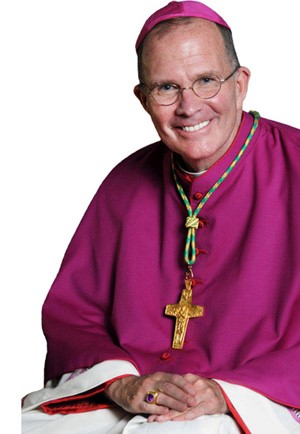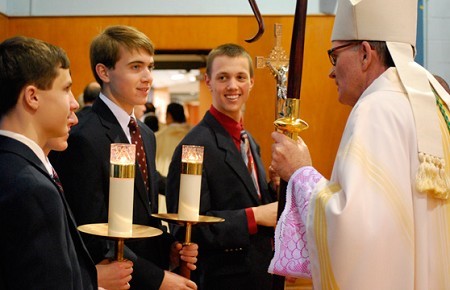Holy Orders in the Catholic Church includes three orders: bishop, priest, and deacon. The Church regards ordination as a Sacrament. In the phrase “Holy Orders”, the word “holy” simply means “set apart for some purpose.” The word “order” (Latin: ordo) designates an established civil body or corporation with a hierarchy, and ordination means legal incorporation into an ordo. In context, therefore, a Holy Order is simply a group with a hierarchical structure that is set apart for ministry in the Church.
Ministry of Vocations
God calls each person to a life of holiness and service, whether single, married, ordained or consecrated. The Diocesan Ministry of Vocations provides discernment opportunities, encouragement, support, education and resources for those responding to God’s call through the ministerial priesthood.
We are committed to fostering an environment where vocations to the priesthood are valued and nurtured within the domestic church of the family and the local parish community. If you would like more information, please call the Parish Office and speak to Father Sheldon, or visit the Ministry of Vocation website.
A message from Bishop David M. O’Connell, C.M.
Someone’s on the line: Take the call!
 A vocation is more than just another job; it is an entire way of life. A vocation is more than just another lifestyle; it is a total commitment. A vocation is more than just something one does; it is who one is. A vocation is a response to a call.
A vocation is more than just another job; it is an entire way of life. A vocation is more than just another lifestyle; it is a total commitment. A vocation is more than just something one does; it is who one is. A vocation is a response to a call.
As with any “call,” there is someone “calling” and someone responding. When speaking of a vocation to the priesthood or life as a religious sister or brother, it is God who is calling to an entire way of life, a total commitment and an identity that is patterned on the life of Jesus Christ. This call, however, comes in many forms, as many as those who hear it. Sometimes, the call is pretty clear and easy to discern. Other times, the call is less obvious and takes a bit of work. But, in either and both cases, God is still calling young men and women to follow him in the Catholic Church as priests, sisters and brothers. He is still offering them a vocation.
When the call is clear, not much needs to be said. For some reason, known only to God, the seed of a vocation is planted and grows in the hearts and souls of some people without much effort. Of course, they still have to pray and discern and be formed spiritually, psychologically and humanly. They still have to deal with temptation and alternative possibilities as do all human beings. They still have attachments, emotions and questions as do all human beings.
But in their lives, there is more immediacy and clarity to realizing their vocation. That was true in my case. I wanted to be a priest for as long as I can remember. Why? Because God put into my life loving and supportive parents and the example of some great priests, especially my pastor, and the sisters who taught me in school. No one pushed me, never. They didn’t need to. I had many other opportunities but, from an early age, I knew what I wanted to be.
 Upon reflection, I don’t consider my experience of a “call,” a vocation, abnormal or strange. But I do think it is probably not as common as the experience of others. And they are the ones I want to reach out to in a special way. Wherever I go in the diocese, whether for Confirmation, Mass, visiting a school, a pastoral visit to a parish, a gathering of young people — wherever and whatever the occasion — I take the opportunity to bring up the idea of a vocation to those I meet and to ask them about it.
Upon reflection, I don’t consider my experience of a “call,” a vocation, abnormal or strange. But I do think it is probably not as common as the experience of others. And they are the ones I want to reach out to in a special way. Wherever I go in the diocese, whether for Confirmation, Mass, visiting a school, a pastoral visit to a parish, a gathering of young people — wherever and whatever the occasion — I take the opportunity to bring up the idea of a vocation to those I meet and to ask them about it.
Most young people chuckle nervously or with embarrassment and wish I would disappear! Some, however, do say “I have thought about it” to which I reply “keep thinking … and praying!”
That’s the way a “call” works. It doesn’t need to be any more complicated than that. God works through other people in many different situations to make his will known. In my many years teaching, I often heard this response when I raised the potential of a vocation to young people: “no one ever asked me.” I believe it doesn’t hurt to ask. Quite the contrary. A word here or there, a little encouragement can and does bear great fruit.
Unfortunately, it has also been my experience that obstacles to a “call,” objections to a vocation, negative responses come not from the young or their peers but, rather, from adults. They have already decided that priesthood or religious life is not a good idea and they generously offer multiple reasons “why not.”
Often enough, when the “call” comes, adults are the ones who say “don’t answer” or, worse, “just hang up.” They consider the convent “a waste” of a young woman’s life or the priesthood an embarrassment. The Catholic Church is “out of touch” and “priests are a bunch of …” you can fill in the blanks.
Sisters and priests (bishops, too!) are not perfect, that’s true, but, then, who is? Only God is perfect and it’s his “call” we’re talking about here.
A “call,” a vocation is more often than not like a whisper: sometimes hard to hear, sometimes drowned out by a lot of other noises, sometimes having to be repeated a couple times before the words are clear. Some of the most important things in life, however, are first said in a whisper.
God is still calling young women and men to be religious sisters, brothers and priests. The Catholic Church still needs them, perhaps now more than ever. As bishop, I have made these vocations a priority, especially the priesthood. I have heard it said: “Without priests, there is no Eucharist. Without the Eucharist, there is no Church.” I believe that with all my mind and heart.
If there is someone you know considering a vocation in the Church, share this little essay with them. You have nothing to lose. The world, the Catholic Church, you and they have everything to gain.
